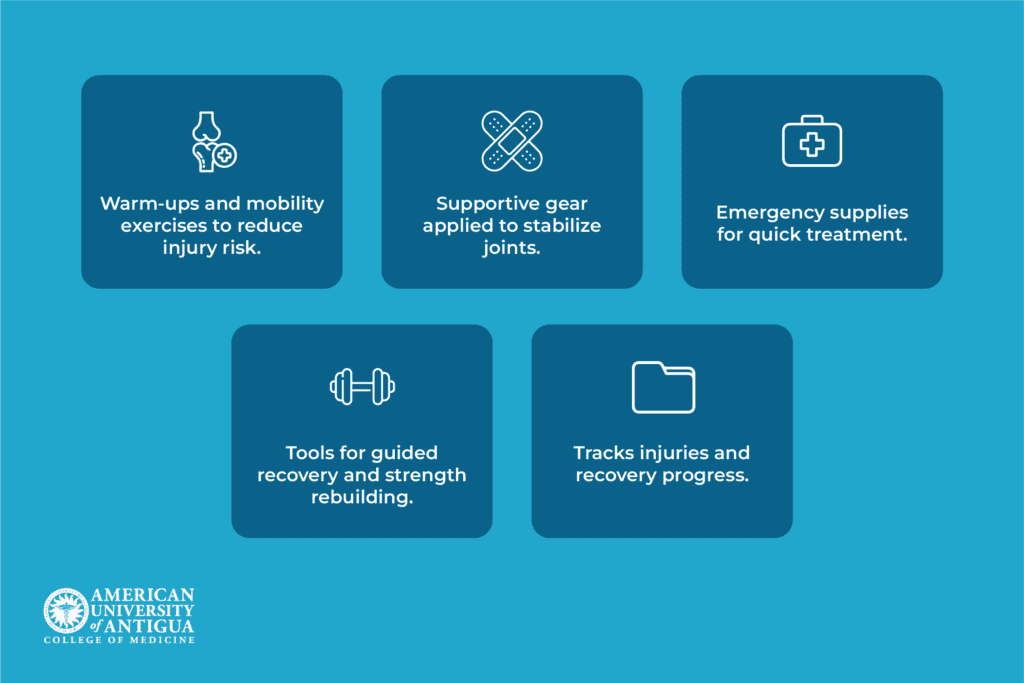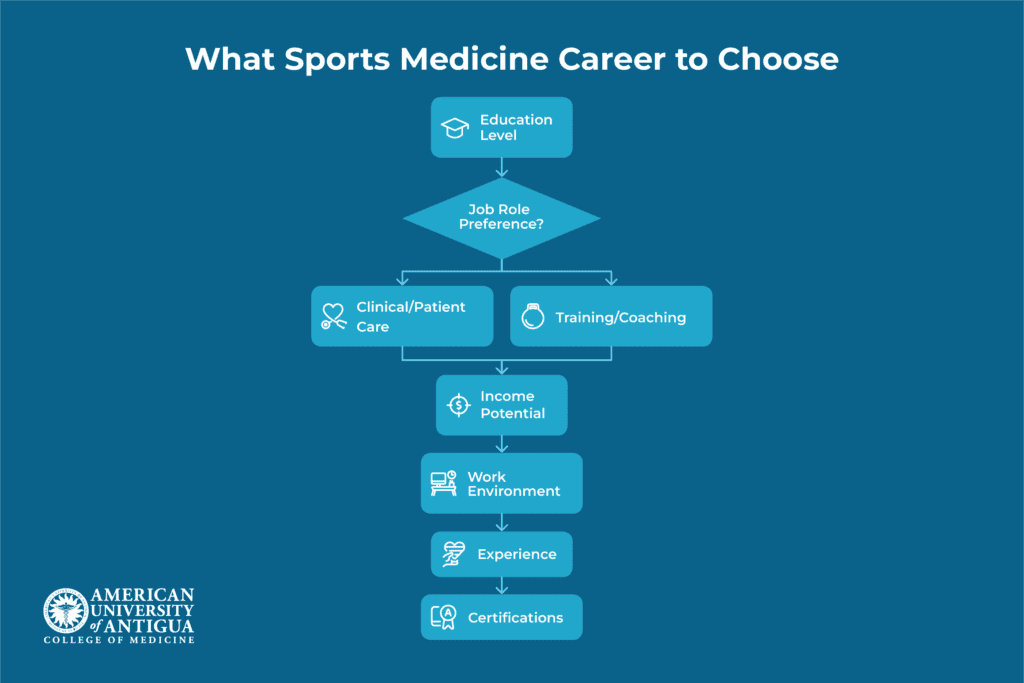Top Sports Medicine Careers to Consider in 2025
Key Takeaways
- Sports medicine includes many career options, from injury treatment to athletic coaching, covering both clinical and training roles.
- Education requirements vary — some positions require advanced degrees, while others require certifications or shorter training.
- Consider your interests, whether you prefer hands-on patient care focusing on training, as well as your ideal work environment and salary expectations.
- Volunteering, shadowing professionals, and pursuing entry-level certifications are great ways to explore the field and make a well-informed career choice.
Sports medicine is all about keeping people moving, healing injuries, and boosting athletic performance — whether it’s for weekend warriors or pro athletes. As more people embrace active lifestyles and the sports industry continues to grow, this field is thriving like never before.
Sports medicine is a perfect mix of science, health, and a love for sports, making it an exciting career path. If you’re interested in helping athletes recover, get stronger, and perform their best, and want to know how to get started, this article will serve as a clear and helpful guide.
✅ Request information on AUA's MD program TODAY!
Top Careers in Sports Medicine
For people who enjoy working with athletes, fitness, and health, there are several career options in the growing field of sports medicine. You can choose a job that focuses more on planning and assistance or one that entails providing direct care.
Each of these professions enables athletes to maintain their health, recover from injuries, and perform their best. We’ll take a closer look at each one in the following sections.
Athletic trainer
Athletic trainers specialize in treating and preventing bone and muscle injuries, particularly in athletes. They work closely with players before, during, and after practices and competitions to keep them safe and help them recover when injuries occur.

They create plans to avoid injuries, provide first aid, oversee rehabilitation exercises, and apply tape or braces as necessary. They also document the course of treatment and recuperation. Athletic trainers work in clinics, hospitals, sports teams, and schools.
Communication skills and quick decision-making are essential for this role since injuries can happen suddenly and need immediate attention.
Average annual salary: $70,689
Physical therapist
Physical therapists help individuals regain movement and manage pain after experiencing injuries, illnesses, or surgeries. After evaluating each patient’s capabilities, they develop individualized therapy programs that incorporate stretches, exercises, and practical methods.
Part of their job also involves educating patients on how to prevent future injuries. Physical therapists are employed in private firms, rehabilitation facilities, hospitals, and outpatient clinics.
They often collaborate with doctors, nurses, and other healthcare professionals to support a patient’s full recovery. This role requires strong communication abilities and a thorough knowledge of human anatomy and movement to support patients in enhancing their mobility and overall quality of life.
Average annual salary: $108,832
Team physician
Team physicians are doctors who focus on the health and well-being of athletes. They diagnose injuries, develop treatment plans, and work closely with athletic trainers, physical therapists, and other healthcare professionals to ensure athletes recover properly.
These physicians often attend sporting events and practices to provide immediate care whenever injuries happen. Most have specialized training in fields like sports medicine, orthopedics, or family medicine, equipping them with a wide range of knowledge about sports-related health concerns.
Their role is essential in keeping athletes safe and in top shape so they can perform at their highest level. This career requires excellent medical knowledge, quick decision-making, and the ability to stay calm under pressure.
Average annual salary: $252,988
Orthopedic surgeon
Orthopedic surgeons specialize in treating issues related to bones, joints, muscles, ligaments, and tendons, often through surgery. They fix broken bones, repair torn ligaments, and replace or restore damaged joints to help patients regain movement and ease pain.
In sports medicine, these surgeons manage serious injuries such as ACL tears or shoulder dislocations. Following surgery, they work closely with physical therapists and athletic trainers to create rehabilitation plans that aid recovery.
Orthopedic surgeons typically work in hospitals, specialized clinics, or private practices. Their role demands extensive training and advanced skills to safely perform complex surgical procedures.
Average annual salary: $367,262
Sports psychologist
Sports psychologists concentrate on the mental and emotional aspects that influence athletic performance. They teach athletes how to stay motivated during competitions, manage stress, and increase their confidence.

These experts also support athletes recovering from injuries by helping them cope with emotions such as frustration and fear. Their job may entail creating individualized mental training programs, leading group sessions, and providing one-on-one therapy.
Sports psychologists work with professional sports teams, universities, rehabilitation centers, and private practices. Their contribution to helping athletes reach their full potential by preserving good mental health is becoming more and more recognized.
Average annual salary: $99,254
Kinesiologist
Kinesiologists focus on how the human body moves and apply this understanding to enhance physical performance and prevent injuries. By studying movement patterns, they design exercise programs that build strength, flexibility, and endurance.
Many kinesiologists work with people recovering from injuries or managing chronic conditions in rehabilitation clinics, fitness centers, or research labs. They also support athletes in maintaining peak physical condition and teach proper movement techniques to avoid future injuries.
This career blends science with hands-on work, making it a great fit for those who are passionate about health, fitness, and how the body functions.
Average annual salary: $108,335
Exercise physiologist
Exercise physiologists create tailored workout plans to strengthen the heart, build muscle, and boost overall fitness. They frequently work with people recovering from chronic conditions like heart disease or diabetes, as well as those rehabilitating after an injury.
On a typical day, they conduct fitness tests, monitor how clients respond to exercise, and adjust workout routines to ensure safety and effectiveness. You’ll find exercise physiologists in hospitals, rehabilitation clinics, gyms, and community wellness programs, where they guide individuals toward healthier, more active lifestyles.
By combining scientific expertise with hands-on coaching, they help prevent future health problems and encourage exercise to become a sustainable habit.
Average annual salary: $57,791
Sports nutritionist
Sports nutritionists guide athletes toward peak performance and faster recovery by creating targeted nutrition strategies. First, they evaluate each athlete’s dietary needs and then craft meal plans that strike the right balance of calories, macronutrients, vitamins, and fluids.

Besides what athletes eat, timing matters too — sports nutritionists advise on when to take supplements and the best times to eat before and after workouts. They also work closely with coaches, trainers, and doctors to give athletes the best care.
You can find sports nutritionists working with sports teams, gyms, or individual clients who want to improve their performance.
Average annual salary: $61,195
Strength and conditioning coach
Strength and conditioning coaches create workout programs designed to increase athletes’ strength, speed, agility, and endurance. Their training plans include weightlifting, speed drills, plyometrics, and flexibility exercises tailored to the athlete’s sport and individual needs.
They collaborate with coaches, athletic trainers, and medical staff to reduce injury risks and prepare athletes physically for competition. These coaches often work with professional sports teams, colleges, and fitness centers.
Their role is essential for athletes who want to improve their physical abilities and stay in top condition throughout the season.
Average annual salary: $54,671
How to Choose the Right Career Path
Choosing the right career path in sports medicine involves carefully considering several key factors. Education is an important one — some careers require advanced degrees and many years of schooling, like becoming a physician, while others may only need certifications or shorter training programs.

Consider whether you prefer clinical roles that involve directly treating patients and managing injuries, or if you’re more interested in training and coaching athletes to improve their performance.
Income potential is another factor to keep in mind since salaries can vary widely depending on the career.
The work environment is important, too — do you want to work in a hospital, a sports team setting, a fitness center, or a research lab? For students exploring their options, gaining hands-on experience through volunteering or shadowing professionals can provide valuable insight.
Earning entry-level certifications can also be a useful step toward starting your career and understanding what each role involves. Delving into these topics will empower you to make a well-informed and assured decision about your future in sports medicine.
Conclusion
Sports medicine offers a wide range of rewarding careers that combine health, science, and a passion for athletics. Whether you’re interested in hands-on patient care, mental health, performance training, or nutrition, there’s a role for you in this growing field.
From athletic trainers and physical therapists to orthopedic surgeons and sports psychologists, each profession plays a vital part in helping athletes stay healthy and perform at their best.
If you’re passionate about sports and want to make a difference, now is the perfect time to explore a future in sports medicine. Take the first step by checking out our programs at the American University of Antigua (AUAMED) and see how you can turn your interest into a fulfilling medical career.
Frequently Asked Questions
What is the difference between sports medicine and physical therapy?
Sports medicine is a broader field focused on diagnosing, treating, and preventing sports-related injuries, while physical therapy specifically involves rehabilitation and restoring movement after injury or surgery.
How long does it take to become a sports doctor?
It typically takes 11–15 years to become a sports doctor, including 4 years of undergraduate studies, 4 years of medical school, 3-5 years of residency, and a 1–2-year sports medicine fellowship.
✅ Request information on AUA's MD program TODAY!